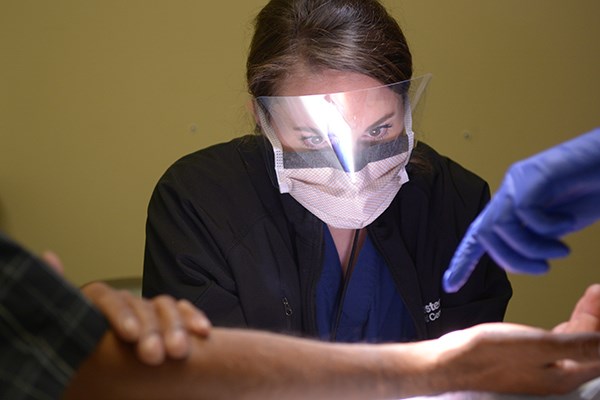Few times in a medical student’s life are more exciting than the start of third year. Coursework is complete, Step 1 is in the rearview mirror, and clinical rotations are starting. It’s an entirely new and exciting phase of your medical career!
Third year is all about creating a solid clinical foundation, not to mention choosing your future career. While it’s important to keep an open mind while completing your clinical rotations, if you’re dead-set on emergency medicine, this guide will set you up for success.
Surgery
Important Concepts: Try to identify the most common reasons for ED consults. Become comfortable doing a thorough abdominal exam and get the differential diagnosis of abdominal pain down cold. Learn what a healing incision and an infected incision look like. Choose surgical subspecialties rotations to become more comfortable with common complaints and diagnoses in those fields.
Important Skills: Wound closure is a great skill to master during your surgery rotation. Many rotations will have a day with mock skills lab; use that time wisely to help you prepare for the real thing. The single-handed suture tie will get you rockstar status as a future ED resident.
Pediatrics
Important Concepts: Learning common pediatric illnesses and how to treat them will give you a leg up in the ED. Diaper rash, strep throat, and newborn exams are all essential parts of treating kids! Learn how to navigate the parent-child relationship.
Important Skills: Learn how to do a thorough pediatric exam at various ages. If you do outpatient pediatrics, you’ll see a lot of well child checks. Use that time wisely to understand what a “well” child looks like and what milestones they should be meeting at typical ages.
Psychiatry
Important Concepts: In many ways, psychiatry and emergency medicine are sister programs. You will see many suicidal, psychotic, anxious, depressed, and “everything in between” patients in the ED daily. Determine which patients meet the hold criteria and why, as well as what makes a person have capacity or not. Understand psychiatric medications and their side effects.
Important Skills: Learn to identify which medications are best used to manage acutely agitated patients and how to interview psychiatric patients safely (you should always have a clear path to the door).
Family Medicine
Important Concepts: As ED visits for non-emergency purposes skyrocket, you will often serve as a surrogate “primary care provider” in the ED. Get comfortable with prescriptions and contraindications for first line agents for blood pressure management, diabetes, and other common chronic diseases.
Important Skills: Do as many head-to-toe physical exams as possible. This will help you to do a solid, speedy ED physical as a resident! Also, simple office procedures like abscess drainages or skin biopsies are good to learn.
Internal Medicine
Important Concepts: IM is the bread and butter of medicine. Dive deep into every diagnosis and learn the appropriate inpatient workup and treatment. Go to the ED for admissions to understand how others may view its chaos and speed.
Important Skills: Learn how to take a thorough History & Physical and differential diagnosis. Become comfortable with inpatient procedures such as thoracentesis and paracentesis.
OB/GYN
Important Concepts: Like surgery, try to attend as many ED consults as possible. Learn how to take a history and manage vaginal bleeding at all life stages including pre-menopausal, pregnant, and post-menopausal.
Important Skills: Get comfortable doing a pelvic exam, checking for signs of imminent delivery, and doing a typical infant delivery.
Neurology
Important Concepts: Pay attention to the evaluations of ED consults. Learn everything you can about seizure and stroke patients and their management; these will be typical patients in the ED. Stroke symptoms can be very subtle; learn to recognize a pattern of deficits and where the lesion is located in the brain.
Important Skills: Become comfor.table doing a full neurologic exam, including the NIH stroke scale. If possible, learn how to do a lumbar puncture.
All Rotations
- Learn how to write orders and prescrip.tions (under supervision, of course).
- Make yourself use every patient to guide your self-study; read and learn about medical and surgical conditions you have not previously studied.
- Common things are common. On whatever rotation you are on, find the 4-5 most common things you see and become expert at the symptoms, diagnosis, and treatment.



